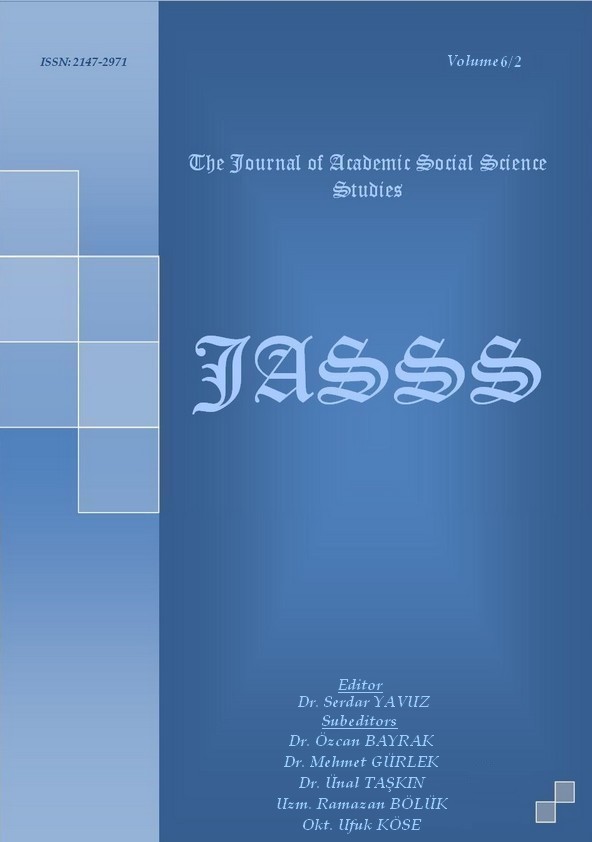CUMHURİYETİN İLANINDAN GÜNÜMÜZE KADAR TÜRKİYE’DE YAYINLANAN ARMONİ KİTAPLARINDAKİ TERMİNOLOJİNİN DEĞİŞİM VE GELİŞİMİ
Author :
Abstract
Bu çalışmanın amacı, Cumhuriyetin ilanından günümüze kadar Türkiye’de yayınlanan Armoni kitaplarında kullanılan müzik terimlerinin hangi değişimlere uğradığı, hangilerinin unutulduğu, hangilerinin benimsenerek Türkçe müzik terminolojisine girdiği başka bir deyişle söz konusu kitaplardaki terminolojinin değişim ve gelişimini ortaya koymak olarak belirlenmiştir. Bu amaçla 1926 yılından günümüze kadar yayınlanmış armoni kitaplarına ulaşılmış ve sıklıkla kullanılan, armoni konusunun ana terimleri belirlenmiştir. Bu terimler yıllarına ve kullanılma yüzdelerine göre sıralanmış, hangi terimlerin değişime uğradığı, hangilerinin benimsendiği ve günümüzde hangi terimlerin kullanıldığının belirlenmesine çalışılmıştır. Araştırma, verilerin doküman incelemesi ile oluşturulduğu betimsel bir çalışmadır. Çalışmanın verileri, 1926 yılında yayınlanan Korsakoff çevirisinden (Osmanlı Türkçesi) günümüze kadar yayınlanmış armoni kitaplarında kullanılan terimlerden elde edilmiştir (N:22). Terimlerin öncelikli olarak kaynağı olan dilde nasıl yazıldığı ve daha sonra da Türkçe terim olarak ne şekilde çevrildiği belirlenmiştir. Belirlenen terimler kullanıldığı yıllara göre sıralanmış ve grafikler halinde sunulmuştur. İkinci olarak terimler aynı yıllarda yayınlanan müzik sözlükleri ve müzik ansiklopedileri gibi yazılı kaynaklardan taranmış, armoni kitaplarına yansımalarının neler olduğu araştırılmış ve elde edilen bulgular yorumlanmıştır. Elde edilen bulgulara göre terimlerin bir çoğunun değişime uğradığı, günümüzde en çok kullanılan terimlerin ilk 20 yıllık dilimlerde (1926-1948) kabul edilen terimler ile aynı olduğu, Türkçeleştirilmesine çalışılan bir çok terimin kullanılmadığı, unutulmaya başladığı, bir kısmının da tamamen unutulduğu görülmüştür. Armoni kitaplarında incelen terimler şu şekilde sınıflandırılmıştır; 1. Türkçeleştirilen çeviri terimler (tam, kırık, akora yabancı sesler, geçit, gecikme, kaçak, işleme gibi), 2. Türkçede okunduğu şekliyle yazılan, yabancı kökenli terimler (armoni, akor, tonik, dominant, sudominant, sansibl, kadans, plagal, otantik, pedal gibi).
Keywords
Abstract
The aim of this study is determined as the music terms used in the Harmony books published in Turkey from the proclamation of the republic to the present which are suffered changes, which are forgotten and which adopted and are entered into the terminology of Turkish music, in other words, to reveal the change and improvement of the terminology used in the books as mentioned. For this purpose, harmony books published so far been achieved since 1926 and determined the frequently used main terms of harmony subject. These terms are ranked according to the years and the percentage of usage, which terms are suffered a change, which are adopted and tried to determine what terms are used today. The research is a descriptive study of the data created with document review. The data of the study are obtained the terms used in the books of harmony from the translation of Korsakoff (Ottoman Turkish) in 1926 published up to the present day (N=22). The terms primarily how written in the source of their language and then what converted to the Turkish term are determined. The terms determined are ranked according to the years of use and are presented in graphics. Secondarily, the terms are scanned from the written sources as music dictionaires and music encyclopedias published in the same years, what are the reflections to the harmony books are researched and the findings are interpreted. According to the findings, most of the terms were suffered a change, the terms most commonly used in present are same as the terms are accepted in the first 20 years (1926-1948), a lot of terms which are tried to translate into Turkish were not used, are begin to forgotten, a part of them are completely forgotten, are seen. The terms examined in harmony books are classified as: 1. Translated into Turkish translation terms (tam, kırık, akora yabancı sesler, geçit, gecikme, kaçak, işleme etc.) 2. The terms of foreign origin are written as they read in Turkish (armoni, akor, tonik, dominant, sudominant, sansibl, kadans, plagal, otantik, pedal etc.).





